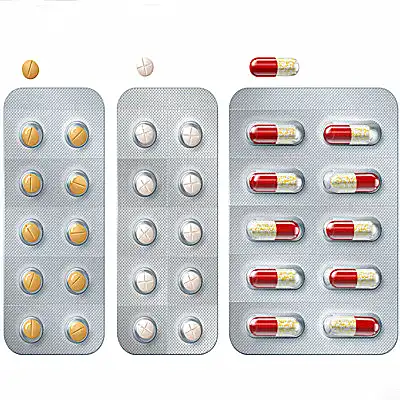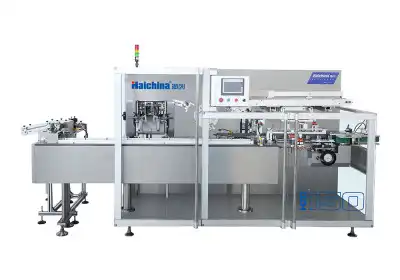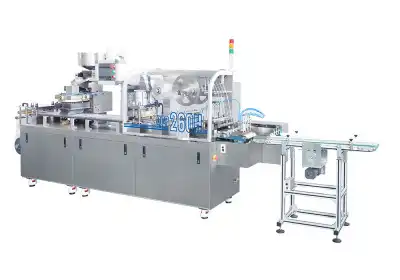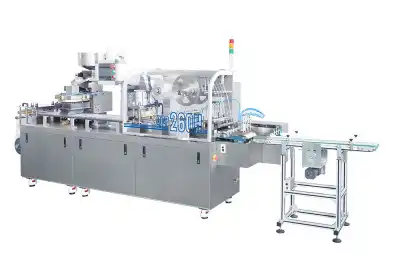Why Blister Packaging Machine Needs GMP Standards?
Blister packaging machines play a crucial role in the pharmaceutical and healthcare industries, ensuring that medications and medical devices are safely packaged and protected. However, the importance of Good Manufacturing Practice (GMP) standards in blister packaging cannot be overstated. GMP standards are essential for blister packaging machines because they guarantee the quality, safety, and efficacy of pharmaceutical products throughout the manufacturing process. By adhering to GMP guidelines, manufacturers can minimize contamination risks, ensure product consistency, and maintain traceability – all of which are paramount in the pharmaceutical industry. Furthermore, GMP compliance helps build consumer trust, facilitates regulatory approval, and ultimately contributes to better patient outcomes. In an era where product safety and quality are non-negotiable, integrating GMP standards into blister packaging machine operations is not just a regulatory requirement but a fundamental necessity for success in the pharmaceutical packaging sector.

The Importance of GMP Standards in Blister Packaging
Ensuring Product Quality and Safety
GMP standards are the backbone of quality assurance in pharmaceutical packaging. When applied to blister packaging machines, these guidelines ensure that every step of the packaging process meets stringent quality requirements. This meticulous approach minimizes the risk of contamination, product mix-ups, and packaging errors that could potentially harm consumers. By implementing GMP standards, manufacturers can guarantee that each blister pack maintains the integrity and efficacy of the enclosed medication, from production to consumption.
Maintaining Consistency in Production
Consistency is key in pharmaceutical manufacturing, and blister packaging is no exception. GMP standards provide a framework for establishing and maintaining consistent production processes. This consistency is crucial for ensuring that each blister pack meets the same high-quality standards, regardless of when or where it was produced. By adhering to GMP guidelines, manufacturers can achieve reproducible results, leading to uniform product quality across different batches and production runs.
Facilitating Regulatory Compliance
In the heavily regulated pharmaceutical industry, compliance with regulatory requirements is non-negotiable. GMP standards for blister packaging machines align with global regulatory expectations, making it easier for manufacturers to gain approval for their products in various markets. This compliance not only streamlines the regulatory process but also demonstrates a commitment to quality and safety, which can enhance a company's reputation and market position.
Implementing GMP Standards in Blister Packaging Processes
Design and Validation of Packaging Equipment
The implementation of GMP standards begins with the design and validation of blister packaging equipment. Machines must be engineered to meet specific GMP requirements, including ease of cleaning, material compatibility, and process control capabilities. Validation processes ensure that the equipment consistently produces packages that meet predetermined specifications. This rigorous approach to equipment design and validation forms the foundation for GMP-compliant blister packaging operations.
Standard Operating Procedures (SOPs)
Developing and adhering to comprehensive Standard Operating Procedures (SOPs) is a cornerstone of GMP compliance in blister packaging. These procedures provide detailed instructions for every aspect of the packaging process, from material handling to machine operation and quality control. Well-documented SOPs ensure that all personnel involved in the packaging process follow consistent, approved methods, reducing the risk of errors and variations in product quality.
Training and Personnel Management
GMP standards emphasize the importance of properly trained personnel in maintaining product quality and safety. In the context of blister packaging machines, this means ensuring that operators, maintenance staff, and quality control personnel are thoroughly trained in GMP principles and specific machine operations. Ongoing training programs and competency assessments help maintain a high level of expertise and awareness among staff, contributing to the overall quality and compliance of the packaging process.
Benefits of GMP-Compliant Blister Packaging Machines
Enhanced Product Protection and Shelf Life
GMP-compliant blister packaging machines are designed to provide superior protection for pharmaceutical products. The stringent controls and quality measures ensure that each blister pack effectively shields its contents from environmental factors such as moisture, light, and oxygen. This enhanced protection not only maintains the integrity of the medication but can also extend its shelf life, providing benefits to both manufacturers and consumers. The precision and consistency achieved through GMP compliance result in packaging that reliably preserves the efficacy of the enclosed drugs throughout their intended lifespan.
Improved Traceability and Recall Management
One of the key advantages of implementing GMP standards in blister packaging processes is the enhanced traceability it provides. GMP-compliant machines and procedures enable manufacturers to track every aspect of the packaging process, from raw materials to finished products. This comprehensive traceability is invaluable in the event of a product recall, allowing for swift and targeted action. The ability to quickly identify and isolate affected batches not only minimizes the scope and impact of recalls but also demonstrates a commitment to consumer safety and regulatory compliance.
Cost-Effectiveness and Operational Efficiency
While implementing GMP standards may require initial investments, it ultimately leads to cost-effectiveness and improved operational efficiency. GMP-compliant blister packaging machines are designed for optimal performance, reducing downtime and minimizing waste. The emphasis on quality control and process consistency results in fewer rejected batches and reduced rework, leading to significant cost savings over time. Moreover, the streamlined processes and documentation required by GMP standards often reveal opportunities for process optimization, further enhancing overall operational efficiency.
Conclusion
The integration of GMP standards in blister packaging machines is not merely a regulatory requirement but a strategic imperative for pharmaceutical manufacturers. By ensuring product quality, safety, and consistency, GMP-compliant packaging processes build consumer trust and facilitate regulatory compliance. The benefits extend beyond quality assurance to include enhanced product protection, improved traceability, and increased operational efficiency. As the pharmaceutical industry continues to evolve, the role of GMP standards in blister packaging will remain crucial, driving innovation and setting new benchmarks for excellence in pharmaceutical packaging.
Contact Us
To learn more about our GMP-compliant blister packaging machines and how they can benefit your pharmaceutical packaging operations, please contact us at [email protected]. Our team of experts is ready to assist you in implementing state-of-the-art packaging solutions that meet the highest quality and regulatory standards.
References
Johnson, M. E. (2019). "GMP Compliance in Pharmaceutical Packaging: A Comprehensive Guide". Journal of Pharmaceutical Sciences, 108(5), 1652-1665.
Smith, A. R., & Brown, L. K. (2020). "Innovations in Blister Packaging Technology: Meeting GMP Standards". Pharmaceutical Technology, 44(3), 36-42.
World Health Organization. (2021). "WHO Good Manufacturing Practices for Pharmaceutical Products: Main Principles". WHO Technical Report Series, No. 986.
European Medicines Agency. (2018). "Guideline on Good Manufacturing Practice for Medicinal Products for Human and Veterinary Use". EudraLex, Volume 4.
Lee, S. H., & Park, J. Y. (2022). "Impact of GMP-Compliant Packaging on Product Shelf Life and Stability". International Journal of Pharmaceutics, 614, 121436.
Thompson, R. C. (2020). "Cost-Benefit Analysis of Implementing GMP Standards in Pharmaceutical Packaging". Journal of Pharmaceutical Innovation, 15(2), 289-301.

Submit the form now to get a unique quote!

ZHEJIANG HAIZHONG MACHINERY CO., LTD.
Popular Blogs
-
 Successful caseProducts and services
Successful caseProducts and servicesHow to Train Employees to Operate a Bottle Packing Machine Effectively?
-
 Successful caseIndustry insights
Successful caseIndustry insightsThe Blister Packaging Process: A Complete Step-by-Step Guide
-
 Successful caseComparative analysisIndustry insights
Successful caseComparative analysisIndustry insightsWhat Type of PVC Is Best for Blister Packing Machines?